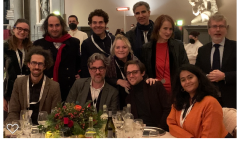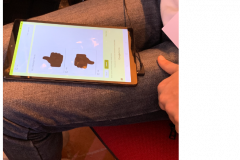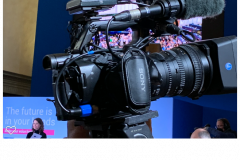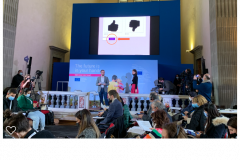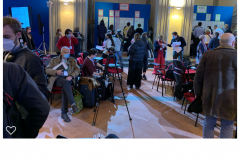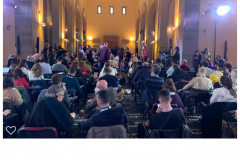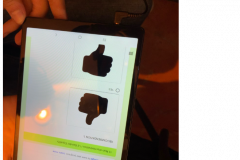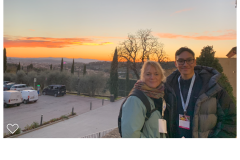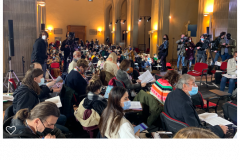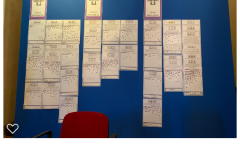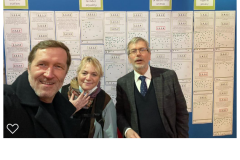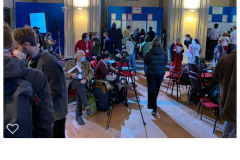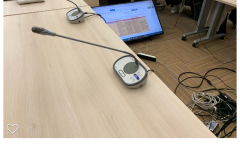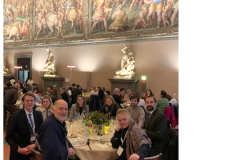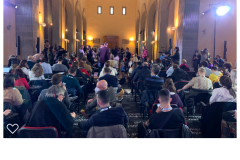THE DEMOCRATIC ODYSSEY
This is a preview The “Democratic Odyssey” a transnational collective journey, open to all who would like to join the flotilla.
Its beacon: a standing European Citizens Assembly that will become a core part of the institutional landscape of the European Union, made of citizens selected by lot, serving on a rotating basis and meeting on a rotating basis around the content.
Our aim with the Odyssey is to create and experiment with a typical prototype for such an Assembly, transnational of course, but also trans-local, i.e. one that feeds itself and in turn feeds local participatory initiatives (local understood here in the rather national sense), and is neither totally top-down (initiated by an institutional authority) nor completely bottom-up (initiated by civil society alone) but follows a third way (initiated, carried and supported by a coalition of actors from all walks of life).
Our campaign will unforld throughout 2023-2024, and the Assembly proper will meet in different configurations during and after the 2024 European elections and before the State of the Union of the new Commission in 2024.
Here a couple of links with the core info as we build the new website:
https://www.eui.eu/news-hub?id=stg-develops-prototype-for-an-eu-wide-citizens-assembly
See also James Mackay (p46), here:
https://euroalter.com/wp-content/uploads/2023/08/EAJ_N2.pdf
And Kalypso Nicolaidis (p16) here:
https://kalypsonicolaidis.com/wp-content/uploads/2023/06/Compendium-1.pdf
And the programme as a whole:
We are launching a constituent network to support the project – i.e. brainstorming around methodology, advocacy, comms, funding – during a series of in-person events adjacent to the Athens Democracy Forum 2023 on 26-29 September this year, holding inter alia a deliberative workshop, at the Pnyx of Athens, crowdsourcing ideas with local civil society and members of the public to inform our agenda-setting process. If you are in Athens then and willing to take part or to connect to the Programme as a whole, please contact: “Gaiba, Andrea” <Andrea.Gaiba@eui.eu>
Check out the STG Initiative on Transnational Democracy at the School of Transnational Governance at EUI which I chair. Do also check out on the website on what we do at EUI on the Conference on the Future of Europe, or COFE. As part of the programme I co-convene the EUI democracy forum with Alberto Alemanno and Niccolo Milanese. Check out our transnational democracy blog: https://blogs.eui.eu/transnational-democracy/
Read our call for the creation of a permanent citizens’ assembly here. Read our 10 principles for the holding of the CoFoE. Check our Citizens Take over Europe website. You may be interested to follow our new EUI democracy blog.
Our transnational democracy forum has published a new set of resources for the COFE, including a series of ‘difficult questions‘ for deliberation updated regularly.
Recent Articles & Other Publications:
July 2022:
- The future of Europe via its history and mythology (YouTube video), House of European History
- Why CoFoE should become a permanent exercise into the EU legislative process Interview with EURACTIV with Kalypso Nicolaïdis by Eleonora Vasques
May 2022:
February 2022:
- Open Letter to Conference Chairs: a successful Conference needs an accountable Conference Plenary!
- L’Europe Puissance Citoyenne (w/ Alberto Alemanno) in Le Groupe d’études géopolitiques
January 2022:
- Citizen Power Europe: The Making of a European Citizens’ Assembly (w/ Alberto Alemanno), published in RED (Revue Européenne du Droit), Issue 3, January 2022, published by Groupe d’études géopolitiques. Available also at SSRN: https://ssrn.com/abstract=4000490
December 2022:
- Unprecedented democratic exercise at the EUI concludes
- Re-immerse yourself in Conference on the Future of Europe Citizens’ Panel hosted at the EUI last weekend – watch the video featuring our Prof Kalypso Nicolaidis and Research Fellow Costanza Hermanin.
- Democracy Forum sets the stage for European Citizens’ Panel in Florence.
- What’s in an Experiment? Participatory Democracy Comes to Town (w/ Jamie Mackay) in la Repubblica. (Italian version: Il valore di un esperimento. La democrazia partecipativa arriva a Firenze).
July 2021:
- Who represents the EU internationally? ‘Sofagate’ reignited the issue and the Conference on the Future of Europe should aim to sort it (w/ Paul Magnette) in Social Europe, 1st July 2021
March 2021:
- 10 years since the adoption of the first ECI regulation: cause for celebration or concern? (w/ Petar Markovic)
- TRIBUNE. “Pour une Assemblée citoyenne européenne” in Le Journal du Dimanche.
February 2020:
- The Conference on the Future of Europe: an Open Letter in Verfassungsblog, 1st Feburary 2020
September 2019:
- A European pivot from space to time in Social Europe, 11th September 2019
EU citizens discuss future of Europe in Florence
#NotWithoutUs | Transparency and citizen participation in the Conference on the Future of Europe!
Citizens Take Over Europe demands transparency and citizen participation in the planning of the Conference on the Future of Europe – Citizens Take Over Europe welcomes President Von der Leyen’s due reference to the Conference on the Future of Europe in her State of the Union address, but calls for greater transparency and citizen participation in the planning of the Conference.
The Conference on the Future of Europe was initially announced by Von der Leyen in advance of her appointment as Commission President as part of a ‘new push for European democracy’. However, in order to be effective, the Conference needs to involve citizens from the very beginning. The interinstitutional negotiations around the Conference are shrouded in secrecy, missing out on the expertise and experience of civil society practitioners in running participative processes, and not including citizens in setting the agenda or format of the Conference.
Including health competences in the agenda of the Conference is welcome, as is the perspective of treaty change this suggests, but the agenda must be broader and co-created with citizens from diverse backgrounds and experiences to reflect their priorities and build trust in a process which is about our common future.
The transnational civil society coalition Citizens Take Over Europe has laid out 10 principles for a citizens-centred Conference on the Future of Europe. NotWithoutUs #SOTEU2020 #CoFoE
UPDATE: OUR PETITION IS ADMISSIBLE and in the Hands of AFCO
Petition No 1070/2020 by Daniela Vancic (Serbian), on behalf of Democracy International e.V., on a plea for transparent and participatory citizens-centred Conference on the Future of Europe
The petitioner highlights the significance of the Conference on the Future of Europe for the European project but considers that citizens are being left out of this important discussion, as they are not involved in the negotiations and discussions in a structured way. The petitioner calls on the European institutions to: (1) organise a public consultation on how to design and organise the Conference as soon as the joint declaration is published, (2) ensure that citizens will be involved in setting the agenda of the Conference (3) facilitate the establishment of an independent EU Civil Society Forum to monitor the Conference and the follow-up process, (4) establish a special European Parliament Working Group on the Conference on the Future of Europe that engages in dialogue with citizens and the EU Civil Society Forum regularly throughout the duration of the Conference and (6) ensure that the joint declaration contains a clear follow-up mechanism and commitment in order to guarantee that citizens’ inputs are adequately and promptly followed up, and that a process of treaty change is launched, if so recommended by the Conference.
Recommendations
– Declare admissible;
– ask the Commission for information;
– send to the AFCO Committee for information;
– assure the petitioner that Parliament wants citizens of all backgrounds, civil society representatives and stakeholders at European, national, regional and local level to be involved in setting the EU’s priorities in line with citizens’ concerns in a bottom-up, transparent, inclusive, participatory and well-balanced approach. To that effect, in a resolution adopted on 18 June, it has urged the Council to “promptly come forward with a position on the format and organisation of the Conference” for citizens’ voices to be heard
https://www.europarl.europa.eu/doceo/document/TA-9-2020-0153_EN.html;
– send the petitioner the EP research briefing: Conference on the future of Europe
https://www.europarl.europa.eu/RegData/etudes/ATAG/2020/651959/EPRS_ATA(2020)651959_EN.pdf.
UPDATE: The CTOE consultation is now online: https://citizenstakeover.eu/news/your-voice-on-the-future-of-europe/2021/
On 25 June, the Brussels-based think tank Bruegel, published a one-hour podcast on the Conference on the Future of Europe with MEP Gabriele Bischoff, John Erik Fossum, Professor, ARENA Centre for European Studies, University of Oslo, and Kalypso Nicolaïdis, Professor of International Relations, University of Oxford. The debate touched upon issues of the Conference’s institutional design, citizens’ participation and the meaning of the process for the EU’s legitimacy.
The European Union is about to embark on a new ambitious Conference on the Future of Europe. The projected process follows previous exercises I have been involved in (the EU Commissions consultations on the White Paper 2000; the Convention drafting a Constitutional treaty 2001-03; the Wise Man group 2008-10).
Along with many friends and colleagues involved in debates on European democracy, we fear that due to its top-down approach, it is set to defy its own purpose: to be “a bottom-up exercise where European citizens are listened to and their voices contribute to the debates on the future of Europe”.
Alberto Alemanno, Niccolo Milanese, and myself drafted an open letter addressed to the President of the European Commission, President of the Council of the European Union and President of the European Parliament as they met on Jan 31 at the Jean Monnet House in Bazoches, France, to discuss Europe’s political challenges. It has already been signed by 100 academics.
In English: https://euroalter.com/2020/for-a-conference-on-a-future-of-europe-open-to-civil-societyhttps://voxeurop.eu/en/2020/conference-future-europe-5124320
Open for signatures: https://docs.google.com/forms/d/e/1FAIpQLSfCMgsEn6VtgFITrjFnAMAHAUFTsMve463O8j_B_MkW3ymZ0A/viewform
Commission Paper https://ec.europa.eu/info/sites/info/files/communication-conference-future-of-europe-january-2020_en.pdf
Charter 2020
In the run-up to the European elections of May 2019, I participated in an exciting collective endeavor to articulate the European project around a Charta 2020 which encourages Europeans to think about the precious value of public goods… Charter 2020
I am taking part in two EU research networks on differentiated integration, that is the key to the future of Europe – check out great work already:
https://www.eu3d.uio.no/
https://euidea.eu/
I am supporting the European Citizens Initiative “Voters Without Borders” which is all about transnational Europe.
